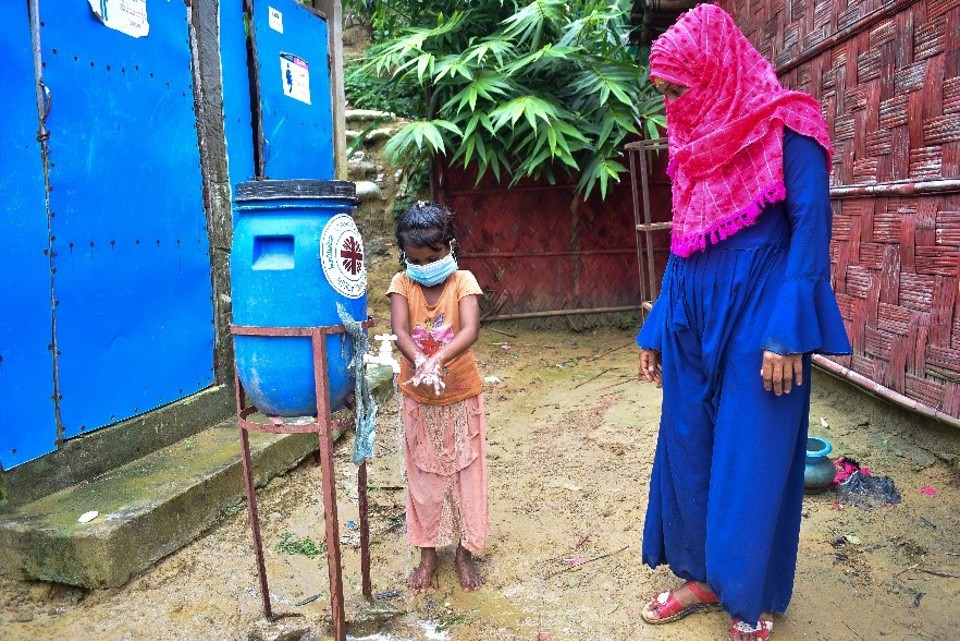
Halima showing her children how to use a hand-washing station in her Rohingya refugee camp in Cox’s Bazar, Bangladesh. Photo credit: Inmanuel Biswas/Caritas Bangladesh
As Australians line up for their COVID-19 vaccinations, the world’s most vulnerable communities continue to struggle with deadly outbreaks – with little hope of a vaccine in sight.
So far, only 1% of people in low-income countries have received at least one dose of a COVID-19 vaccine, placing people facing extreme poverty in a highly vulnerable position.
Lockdowns in Bangladesh threaten Rohingya refugees
As Bangladesh enters its most severe lockdown yet, amid a deadly outbreak sparked by the highly-contagious Delta variant, experts are warning that the new variant poses the greatest threat to countries that are poorly vaccinated, with low-income countries among the worst affected.
Bangladesh’s national testing rate shows a staggering 20 per cent of people testing positive and alarming spikes in the daily death tolls. There are also serious impacts for the world’s largest refugee camp which is in Cox’s Bazar, where nearly one million Rohingya live in informal housing.
However, the World Health Organization says just over 10 million vaccine doses have been administered in Bangladesh - most of those are only first doses, in a population of more than 160 million.
Delta plus variant in India causes chaos
Meanwhile, India has identified a new, even more transmissible strain of COVID-19, known as ‘Delta plus’, as it struggles to recover from the devastating second wave that struck in April. The country has now recorded over 30 million infections.
COVAX faces new challenges in reaching global vaccine equity
In Africa, it’s estimated that less than one percent of the population is fully vaccinated – the lowest ratio globally.
Achieving vaccine equity is essential to avoid more outbreaks, deaths and the development of new variants. COVAX is an international World Health Organisation-backed program, aimed at levelling the playing field, by providing much-needed vaccine doses to lower-income countries.
GAVI, one of the organisations leading COVAX, recently approved an additional $775 million to fund the distribution of COVID-19 vaccines to lower-income countries over the next couple of years. To date, the initiative has raised over $2.4 billion from a combination of 40 donor governments including Australia, corporate sponsors and foundations.
When it first launched in April 2020, COVAX was applauded as a sound and noble scheme but lately it has been faltering. Its rollout has been by adversely impacted by a number of challenges. One challenge is that India, the world’s biggest manufacturer of COVID-19 vaccines, suspended its exportation of vaccines earlier this year, due to its own challenges with a second wave of COVID-19. A shortfall in funding also poses a significant threat to the longevity and efficacy of the initiative. Finally, pharmaceutical companies’ refusal to waive the patent on COVID-19 vaccines has resulted in high-income countries controlling the supply.
In countries which COVAX has managed to reach, misinformation and fear have derailed efforts to immunise vulnerable populations. In the Democratic Republic of the Congo, 1.3 million AstraZeneca doses, out of 1.7 million that were allocated through the scheme, had to be redistributed to other African countries before they expired. Health professionals have cited a lack of trust, fake news and a prevalence of other life-threatening diseases such as Ebola, as key obstacles to the efficacy of COVAX’s rollout in the DRC.
Caritas Australia is working with partners to protect the vulnerable from COVID-19
To minimise the challenges that low-income countries face in protecting people against COVID-19, we work with local partner organisations on the ground, supporting vulnerable communities to promote awareness about preventing the spread of COVID-19 and by distributing masks, PPE, soap and sanitiser.
Caritas Australia’s partner, Caritas India, is working to strengthen health infrastructure and to ensure that the most vulnerable populations have access to lifesaving treatment. It is also setting up priority treatment centres for COVID-19 patients, providing medical care and food at either no cost or subsidised cost, to ensure that marginalised people do not miss out. The 77 centres set up have so far reached 4,702 patients in 16 states.
James Gomes, Director at Caritas Bangladesh, says that it helps that Caritas organisations are working in communities long-term.
If you’d like to make a donation to support our work, please click the link below.

















